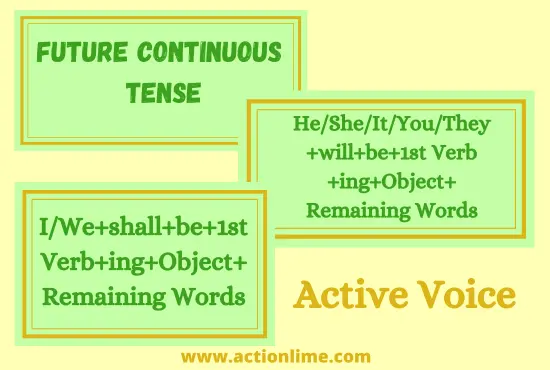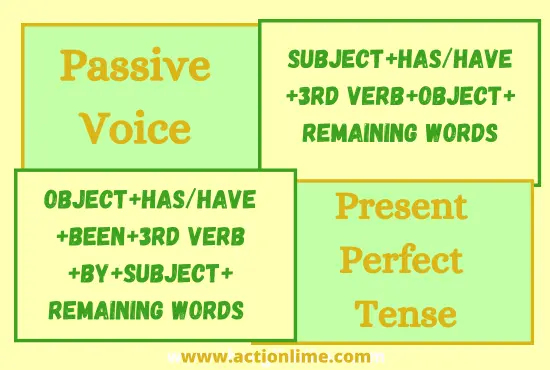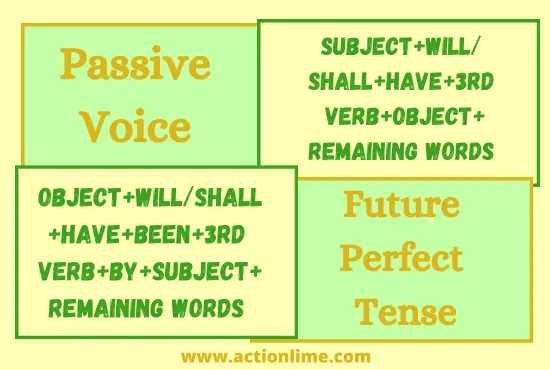Present Indefinite Tense|Passive Voice
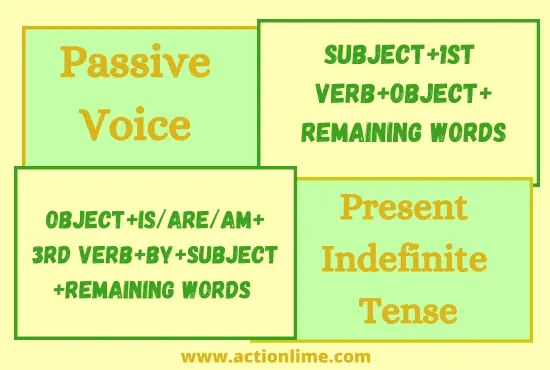
Present Indefinite Tense or Simple Present Tense(Passive Voice) is used to represent the habitual passive actions of the present time. Active Voice Sentences of Present indefinite Tense can easily be converted into Passive Voice Sentences by following the following general rules.
Rules to Convert Present Indefinite Tense(Active Voice) Sentences to Passive Voice Sentences
To make a Passive Voice Sentence from the Active Voice Sentence of Present Indefinite Tense or Simple Present Tense, just follow the following rules.
- First of all, convert the Object(me, us, you, them, him, her, it) of the Active Voice Sentence into the Subject (I, We, You, They, He, She, It) of the Passive Voice Sentence.
- Then, use the helping verb “is/are/am”, according to the Subject of the Passive Voice Sentence.
- After this, use the 3rd form of Verb to show that the action is in the passive state, i.e; the action is being done on the Subject of the Passive Voice Sentence.
- Then, use the preposition “by” to show the doer of the action.
- And then, convert the Subject(I, We, You, They, He, She, It) into the Object(me, us, you, them, him, her, it) of the Passive Voice Sentence.
- At the end, write the remaining words of the Sentence, if there are any in the Active Voice Sentence of Present Indefinite Tense or Simple Present Tense.
Helping Verbs of Present Indefinite Tense(Passive Voice)
Following are 3 helping verbs that can be used in Present Indefinite Tense(Passive Voice) Sentences to indicate the habitual passive actions of the present time.
“Is” As Helping Verbs in Present Indefinite Tense(Passive Voice)
“Is” can be used as a helping verb in Present Indefinite Tense(Passive Voice) Sentences with Singular Number Nouns and Pronouns (He, She, It). Thus, Passive Voice Sentences of Present Indefinite Tense with “is” as a helping verb, follow the following Sentence Structure.
Singular Number Nouns/Pronouns+ Is+ 3rd Verb+ by+ Subject+ Remaining Words
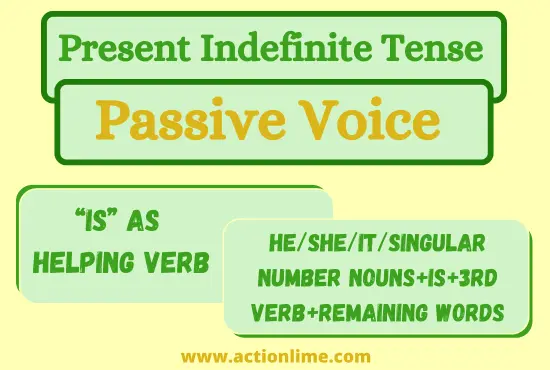
“Are” As Helping Verbs in Present Indefinite Tense(Passive Voice)
“Are” is used as a helping verb in Present Indefinite Tense(Passive Voice) Sentences with Plural Number Nouns and Pronouns (We, You, They). So, Passive Voice Sentences of Present Indefinite Tense with “are” as a helping verb follow the following Sentence Structure.
Plural Number Nouns/Pronouns+ are+ 3rd Verb+ by+ Subject+ Remaining Words

“Am” As Helping Verbs in Present Indefinite Tense(Passive Voice)
“Am” is used as a helping verb only only one pronoun “I” in Passive Voice Sentences of Present Indefinite Tense. Thus, Passive Voice sentences having “am” as a helping verb have the following Sentence Structure.
I+ am+ 3rd Verb+ by+ Subject+ Remaining Words
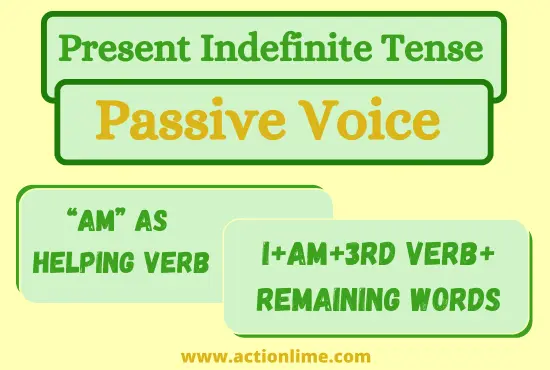
Assertive Sentence Structure of Present Indefinite Tense(Passive Voice)
The Assertive or Declarative Sentences of Present Indefinite Tense(Passive Voice) Sentences take “is/are/am” as helping verbs according to the type of Singular or Plural type of Number Nouns and Pronouns, and with 3rd form of Verb to indicate the passive habitual actions of the present time. Thus, Assertive Sentences of Present Indefinite Tense(Passive Voice) have the following general Sentence Structure or Sentence formula.
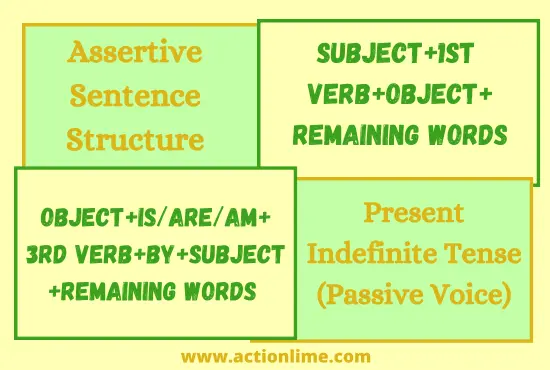
Examples of Assertive Sentences of Present Indefinite Tense(Passive Voice)
Following are some examples of Assertive Sentences of Present Indefinite Tense(Passive Voice).
- I break a plate.
- A plate is broken by me.
- We eat oranges in Winter.
- Oranges are eaten by us in Winter.
- You beat me.
- I am beaten by you.
- They sell potatoes.
- Potatoes are sold by them.
- He always tells a lie
- A lie is always told by him.
- She always speaks the truth.
- The truth is always spoken by her.
- It rains daily after 5 PM.
- It is rained daily after 5 PM.
- She calls me every evening.
- I am called by her every evening.
- He helps us with our homework.
- We are helped by him with our homework.
- They see you at the park every morning.
- You are seen by them at the park every morning.
- The teacher asks them questions in the class.
- They are asked questions by the teacher of the class.
- I visit him on weekends.
- He is visited by me on weekends.
- Her boss emails her the updates regularly.
- She is emailed the updates regularly by her boss.
- The updates are emailed to her by her boss regularly.
- The music relaxes the cat.
- The cat is relaxed by the music
Negative Sentence Structure of Present Indefinite Tense(Passive Voice)
Negative Sentences of Present Indefinite Tense(Passive Voice) takes “not” with respective helping verbs “is/are/am” according to the type of Number Nouns and Pronouns. “Not” is used to show the negative nature of passive habitual actions of the present time. Thus, Passive Negative Sentences of Present Indefinite Tense have the following Sentence Structure or Sentence formula in Negative Sentences.
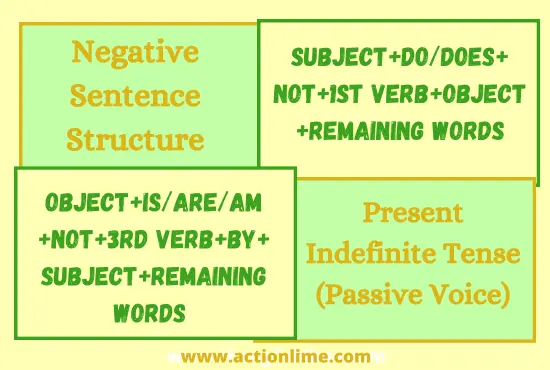
Examples of Negative Sentences of Present Indefinite Tense(Passive Voice)
Following are some examples of Negative Sentences of Present Indefinite Tense(Passive Voice).
- I do not boil eggs.
- Eggs are not boiled by me.
- We do not like swimming.
- Swimming is not liked by us.
- You do not read this book every day.
- This book is not read by you every day.
- They do not draw the map of the World.
- The map of the World is not drawn by them.
- He does not sing a song.
- A song is not sung by him.
- She does not wash your clothes.
- Your clothes are not washed by her.
- It does not smell like fresh bread in the kitchen.
- It is not smelt like fresh bread in the kitchen.
- The guide does not show me around the museum.
- I am not shown by the guide around the museum.
- Our librarian does not lend us books for a week.
- We are not lent books by our librarian for a week.
- Books are not lent to us by our librarian for a week.
- The chef does not cook you a special meal every day.
- You are not cooked a special meal by the chef every day.
- A special meal is not cooked for you every day.
- The company does not invite them to the annual conference.
- They are not invited by the company to the annual conference.
- The teacher does not give him homework every day.
- He is not given homework by the teacher every day.
- Homework is not given to him by the teacher every day.
- The director does not brief her on the project status.
- She is not briefed by the director on the project status.
- It does not take much time to learn a new language.
- A new language is not taken much time to learn.
Interrogative Sentence Structure of Present Indefinite Tense(Passive Voice)
Interrogative Sentences of Present Indefinite Tense(Passive Voice) have “is/are/am” as a helping verb at the start of Interrogative Sentences in order to show the questionable nature of the passive habitual actions of the present time. Thus. Interrogative Sentences in Present Indefinite Tense(Passive Voice) have the following Sentence Structure.

Examples of Interrogative Sentences of Present Indefinite Tense(Passive Voice)
Following are some examples of Interrogative Sentences of Present Indefinite Tense(Passive Voice).
- Do I teach them English?
- Are they taught English by me?
- Is English taught to them by me?
- Do we assist them every day?
- Are they assisted by us every day?
- Do you praise her very much?
- Is she praised by you very much?
- Do they kill a snake?
- Is a snake killed by them?
- Does he play football in the afternoon?
- Is football played by him in the afternoon?
- Does she break toys?
- Are toys broken by her?
- Does it happen every year?
- Is it happened every year?
- Does she always help me with my projects?
- Am I always helped by her with my projects?
- Does he see us at the gym every morning?
- Are we seen by him at the gym every morning?
- Do they invite you to their parties?
- Are you invited by them to their parties?
- Does the doctor advise them to eat healthier?
- Are they advised by the doctor to eat healthier?
- Does his friend text him daily?
- Is he texted by his friend daily?
- Does the waiter serve her quickly?
- Is she served by the waiter quickly?
- Does it feel cold in this room?
- Does it feel cold in this room?
Negative-Interrogative Sentence Structure of Present Indefinite Tense(Passive Voice)
Negative-Interrogative Sentences of Present Indefinite Tense or Simple Present Tense(Passive Voice) take “Is/are/am” as a helping verb at the start of Sentences to show the questionable nature of the Passive habitual present action and “not” after the object of the sentences to show the negative nature of the action. Thus, Negative-Interrogative Sentences of Present Indefinite Tense(Passive Voice) have the following Sentence Structure or Structural formula to show the negative and questionable nature of the passive habitual actions of the present time.

Examples of Negative-Interrogative Sentences of Present Indefinite Tense(Passive Voice)
Following are some examples of Negative-Interrogative Sentences of Present Indefinite Tense(Passive Voice).
- Do I not polish my shoes myself?
- Are my shoes not polished by me myself?
- Do we not learn this poem by heart?
- Is this poem not learned by us by heart?
- Do you not make a noise?
- Is a noise not made by you?
- Do they not punish their servant?
- Is their servant not punished by them?
- Does he not like sweets?
- Are sweets not liked by him?
- Does she not like to play tennis?
- Is the tennis not liked to play by her?
- Does it not cost a lot to live in the city?
- Is it not cost a lot to live in the city?
- Does the manager not update me on the project?
- Am I not updated by the manager on the project?
- Does he not frequently advise us on financial matters?
- Are we not advised by him on financial matters?
- Do your friends not often invite you to their gatherings?
- Are you not invited by your friends to their gatherings?
- Does the store not send them promotional emails regularly?
- Are they not sent promotional emails by the store regularly?
- Does the coach not encourage him to practice daily?
- Is he not encouraged by the coach to practice daily?
- Does the system not alert her when there is an update?
- Is she not alerted by the system when there is an update?
- Does it not taste delicious?
- Is it not tasted delicious?
